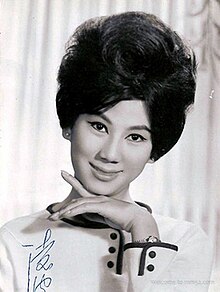Ivy Ling Po | |||||||||||
|---|---|---|---|---|---|---|---|---|---|---|---|
 Ivy Ling Po in the 1960s | |||||||||||
| Born | 16 November 1939 | ||||||||||
| Occupation(s) | Actress, singer | ||||||||||
| Years active | 1949–1980s | ||||||||||
| Spouses | |||||||||||
| Children | Benson Sy (b. 1956) Kenneth Bi (b. 1967) Daniel Bi (b. 1974) | ||||||||||
| Awards | Asian Film Festival Best Actress 1964 Lady General Hua Mu-lan Golden Horse Awards – Special Jury Award 1963 The Love Eterne Best Actress 1967 Too Late for Love | ||||||||||
| Chinese name | |||||||||||
| |||||||||||
| Musical career | |||||||||||
| Origin | Hong Kong | ||||||||||
| Genres | Huangmei opera Cantonese opera Amoy opera | ||||||||||
| Instrument | Singing | ||||||||||
Huang Yu-chun (born 16 November 1939 in Shantou, Republic of China), professionally known by her stage name Ivy Ling Po, is a retired Hong Kong actress and Chinese opera singer. She gained widespread fame during the 1960s for her roles in several popular Huangmei opera films, most notably The Love Eterne (1963), which transformed her to stardom across Asia. Her role in the film is considered a defining performance in the genre, solidifying her status as a cultural icon.[2][3]
She initially acted in Amoy Hokkien films under the stage name Xiaojuan (Chinese: 小娟; Pe̍h-ōe-jī: Sió-koan), and then appeared in Cantonese films under the stage name Shen Yan (Chinese: 沈雁; Jyutping: Sam2 Ngaan6) before joining the Shaw Brothers Studio to act in Mandarin films as (Ivy) Ling Po (Chinese: 凌波; pinyin: Líng Bō) where she rose to prominence.[peacock prose]
- ^ Cite error: The named reference
udnwas invoked but never defined (see the help page). - ^ Laikwan Pang, Day Wong Masculinities and Hong Kong cinema – Page 21 – 2005 "Ivy Ling became the Shaw Brothers' top star thereafter, all the while playing the male roles in opera-derived films or overtly ... He specialized in opera films and historical dramas, scripting a number of films for Ivy Ling, but also for Li Li-hua and ..."
- ^ Hong Kong Cinema: A Cross-cultural View -Kar Law, Frank Bren, Sam Ho – 2004 Page 264 "IVY LING PO (BORN IN 1939) Ivy Ling Po is a star whose stardom must count as one of the most curious in world film history. She is a screen goddess who made her mark playing men. In 1962, when Shaw Bros. was casting for the hung mei ..."